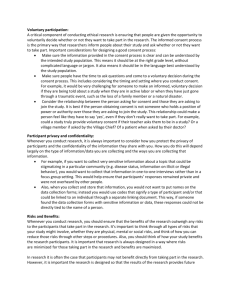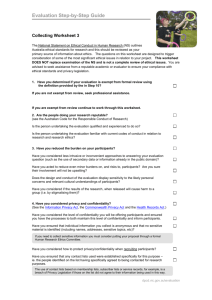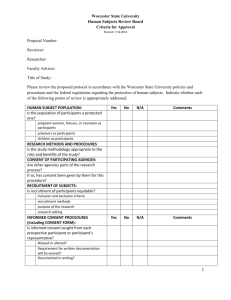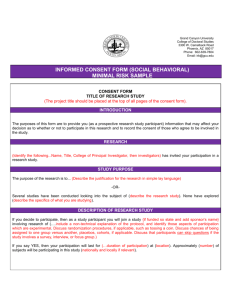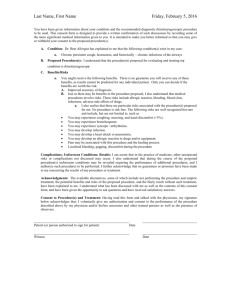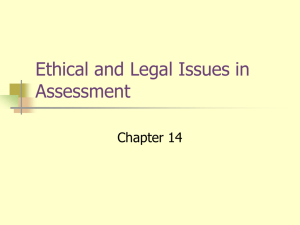Tool
advertisement
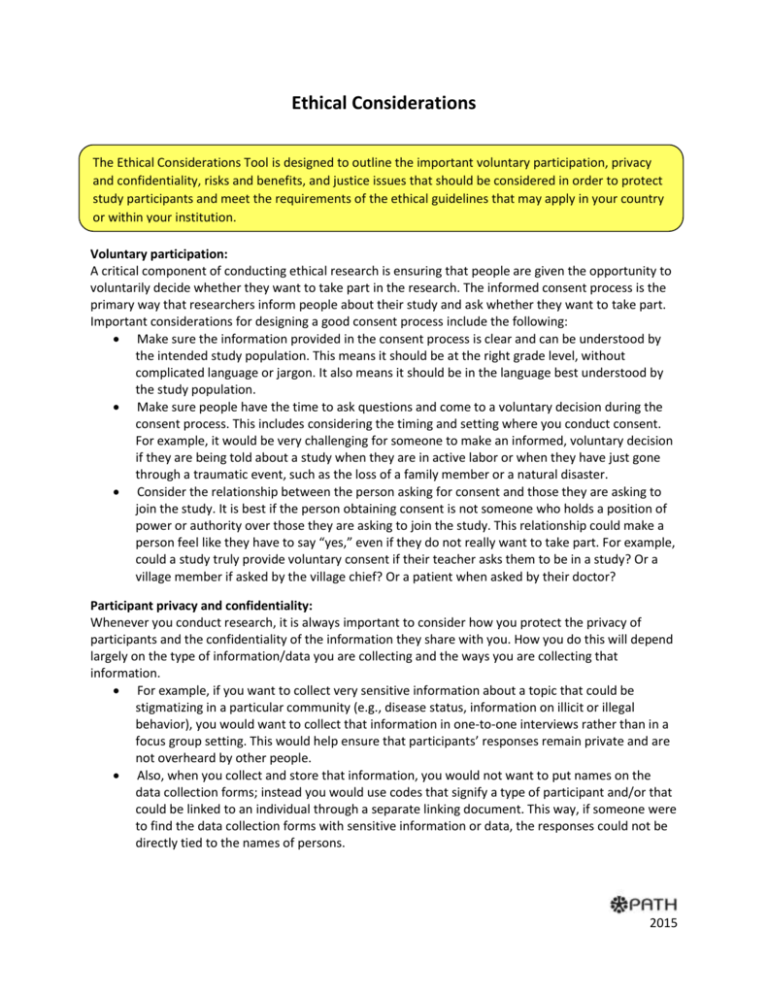
Ethical Considerations The Ethical Considerations Tool is designed to outline the important voluntary participation, privacy and confidentiality, risks and benefits, and justice issues that should be considered in order to protect study participants and meet the requirements of the ethical guidelines that may apply in your country or within your institution. Voluntary participation: A critical component of conducting ethical research is ensuring that people are given the opportunity to voluntarily decide whether they want to take part in the research. The informed consent process is the primary way that researchers inform people about their study and ask whether they want to take part. Important considerations for designing a good consent process include the following: Make sure the information provided in the consent process is clear and can be understood by the intended study population. This means it should be at the right grade level, without complicated language or jargon. It also means it should be in the language best understood by the study population. Make sure people have the time to ask questions and come to a voluntary decision during the consent process. This includes considering the timing and setting where you conduct consent. For example, it would be very challenging for someone to make an informed, voluntary decision if they are being told about a study when they are in active labor or when they have just gone through a traumatic event, such as the loss of a family member or a natural disaster. Consider the relationship between the person asking for consent and those they are asking to join the study. It is best if the person obtaining consent is not someone who holds a position of power or authority over those they are asking to join the study. This relationship could make a person feel like they have to say “yes,” even if they do not really want to take part. For example, could a study truly provide voluntary consent if their teacher asks them to be in a study? Or a village member if asked by the village chief? Or a patient when asked by their doctor? Participant privacy and confidentiality: Whenever you conduct research, it is always important to consider how you protect the privacy of participants and the confidentiality of the information they share with you. How you do this will depend largely on the type of information/data you are collecting and the ways you are collecting that information. For example, if you want to collect very sensitive information about a topic that could be stigmatizing in a particular community (e.g., disease status, information on illicit or illegal behavior), you would want to collect that information in one-to-one interviews rather than in a focus group setting. This would help ensure that participants’ responses remain private and are not overheard by other people. Also, when you collect and store that information, you would not want to put names on the data collection forms; instead you would use codes that signify a type of participant and/or that could be linked to an individual through a separate linking document. This way, if someone were to find the data collection forms with sensitive information or data, the responses could not be directly tied to the names of persons. 2015 Risks and benefits: Whenever you conduct research, you should ensure that the benefits of the research outweigh any risks to the participants that take part in the research. It is important to think through all types of risks that your study might involve, whether they are physical, mental, or social risks, and think of how you can reduce those risks through other steps or procedures. Also, you should think of how your study benefits the research participants. It is important that research is always designed in a way where risks are minimized for those taking part in the research and benefits are maximized. In research it is often the case that participants may not benefit directly from taking part in the research. However, it is important the research is designed so that the results of the research provide future benefits. This could be future benefits to the participants themselves, to others like them, or to their communities or society at large. Justice: When you plan your research, it is important to consider what populations you are going to include in your research and have a strong rationale for asking those populations to take part. From a justice perspective, research should address questions that are relevant for the population you are doing your research with. Additionally, research should not ask some groups to bear all the burdens or risks of the research while other groups are intended to receive the benefits of the research. For example, if research is being done to test a new, improved method for preventing a disease, it would not be just if all the research were done in impoverished settings where people suffer greatly from that disease but the end product is only intended for other populations who can pay for this new method. It is also important to be sure that your research does not exclude people or populations that could benefit from the research. For example, if women are excluded from research on a new drug, then women will not benefit from that new drug once it is approved since there would be no data on how that drug affects women. 2015
